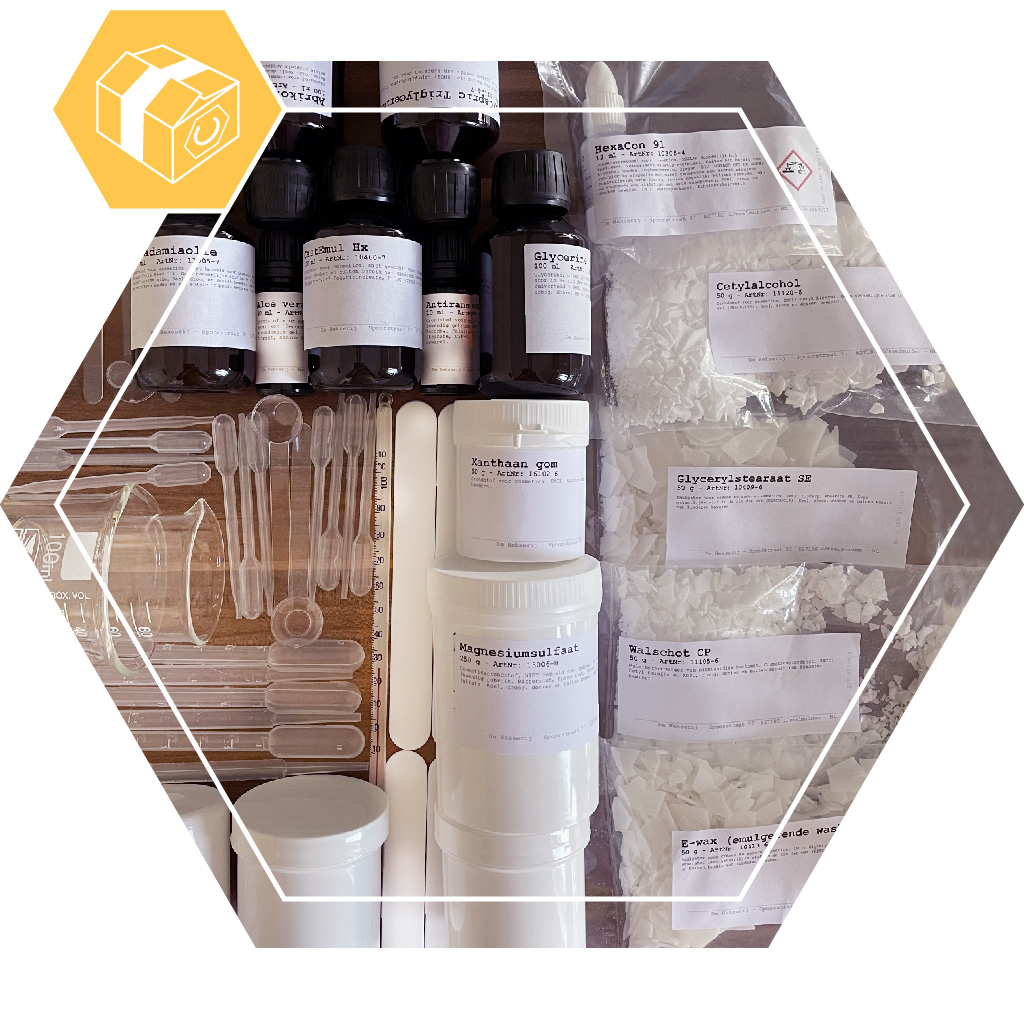Cosmetics raw material
Description
This distance course is only available in Dutch.
IMPORTANT: Making the formulations ('recipes') from the course requires a high-quality scale that can weigh at least 100 grams with a precision of 0,1 gram, this scale is NOT included in the course and must be purchased separately (unless you already have one).
The course is written, ie you can follow the course at home in your own time and take as long as you want. The course is intended for professionals and amateurs who aspire to a professional level, it is not intended to put together a cream in an hour. The study time required will vary per person, some will be able to complete the entire course in one day; it is better to use it for a few half-days.
It is not necessary to have special prior knowledge, although it can be useful. What is important is good knowledge of the Dutch language, good math skills and preferably at least basic MBO level in terms of education. Furthermore, there is always a small risk that we cannot teach you anything new, for example because you are quite experienced or have studied books in other languages.
The course consists of three parts: - A Dutch syllabus of about 20 pages in which the theory is briefly discussed and the formulations are included.
- Two months of email support.
- All necessary raw materials, jars, pipettes, spatulas and a thermometer to make the eight formulations from the brochure. NOT included is a suitable scale.
The course is written, ie you can follow the course at home in your own time and take as long as you want. The course is intended for professionals and amateurs who aspire to a professional level, it is not intended to put together a cream in an hour. The study time required will vary per person, some will be able to complete the entire course in one day; it is better to use it for a few half-days.
It is not necessary to have special prior knowledge, although it can be useful. What is important is good knowledge of the Dutch language, good math skills and preferably at least basic MBO level in terms of education. Furthermore, there is always a small risk that we cannot teach you anything new, for example because you are quite experienced or have studied books in other languages.
The course consists of three parts: - A Dutch syllabus of about 20 pages in which the theory is briefly discussed and the formulations are included.
- Two months of email support.
- All necessary raw materials, jars, pipettes, spatulas and a thermometer to make the eight formulations from the brochure. NOT included is a suitable scale.
Syllabus
A simply designed folder with about 20 pages in A4 format. The text is concise, but quite complete. The syllabus covers the following topics, among others:- - Cream and emulsion
- - Knowledge about raw materials
- - Knowledge about production
- - Myths related to creams
- - W/O and O/W creams
- - Stabilize and preserve
- - Consistency
- - Function of creams
- - Formulations of eight creams
Support
Because everyone has different prior knowledge, different experience and a different learning level, but also, for example, different goals, there is a lot of customization in the form of support by email. This works as follows: you work through the material and if there are questions or problems that you cannot solve yourself, you send them to De Hekserij customer service. Even if there are questions regarding your specific situation, you can ask them, we will try to help you as best as possible. You can submit the questions up to two months after purchasing the course, but in many cases we can also be of service if there are questions after that. For the rest: questions are treated reasonably: we cannot always deal with every detailed question, in principle we spend a maximum of two hours answering your questions. Make the most of this support!Materials
The following materials and raw materials are provided when you order this course:- 10306-4 HexaCon 91 10 ml
- 10540-4 Tocopherol 10 ml
- 10409-6 Glyceryl stearate SE 50 g
- 10413-6 E-wax 50 g
- 10460-7 Castemul 100 ml
- 10520-4 Aloe Vera 1:10 10 ml
- 10630-7 Glycerin 100 ml
- 11005-7 Macadamia oil 100 ml
- 11009-7 Apricot kernel oil 100 ml
- 11105-6 Walschot 50 g
- 11120-6 Cetyl alcohol 50 g
- 11124-7 Caprylic/Capric Trigl. 100 ml
- 13006-8 Magnesium sulphate 250 g
- 14052-1 Ointment jar white 125 ml (8 pieces)
- 14901-1 Ointment spatula (5 pieces) ór wooden spatula 10 pcs
- 16102-6 Xanthan gum 50 g
- 30037-1 Beaker 100 ml
- 30038-1 Beaker 250 ml
- 30061-1 Thermometer -10/100
- 30107-1 Measuring spoon plastic 2.5 ml (10 pieces)
- 30110-1 Dropping pipette plastic 3 ml (10 pieces)
- 30111-1 Dropper pipette plastic 1 ml (10 pieces)
- Syllabus


